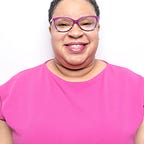Its Sexual Assault Awareness Month. Here are some black women led groups to support.
Sexual assault and violence is a cultural, policy, and structural problem. It’s woven in our family life, places of employment, and the way we navigate public spaces. It’s also a problem that too often disproportionately affects women, especially black women, femmes, and girls[1]. While this is can be explained by things like the over sexualizing of black women and femmes, the adultification of black girls and misogynoir, the connection between sexual assault and racialized terror is strong and should be credited to one of America’s original sins, enslavement.
Sexual assault is something that enslaved black women understood all too well. This common form of violence was used as a way to express racial dominance over black women and to practice gendered control of all enslaved people. Even the law at the time declared that it was impossible to rape an enslaved woman[2]. This sentiment has transcended time and has led to centuries of violence for black women, femmes and girls.
Black women leaders like Congresswoman Maxine Waters, Sojourner Truth, and Rosa Parks have a long track record of fighting to end gender based violence. Sadly, this work is sometimes seen as unrelated[3] to the larger black liberation movement. As more of this work becomes public knowledge, it is important that folks reflect on this work and to support the efforts of groups that hold these truths as they do intersectional work to eradicate sexual violence against black women, femmes and girls.This legacy does, however, live on in many black women led organizations, like the Me Too Movement organization, Black Womens Blueprint and The Ujima Center.
The Me Too Movement[4] was founded by activist and survivor Tarana Burke in 2006. When the hashtag went virtual in 2017, the world began to examine the role of sexual assault and violence on a massive scale. Since then, the Me Too Movement has developed numerous action toolkits, launched a HBCU fellowship program, developed a Survivor’s Vote Initiative, and launched a Survivor Leadership Training program as well.
Black Women’s Blueprint (BWB)[5] was founded in 2008 by Farah Tanis and by survivors that are dedicated to healing and transformation. BWB uses training, services, and advocacy to meet the diverse needs of survivors all across the world. Recently, they have introduced a Sista Van Mobile Unit to the community that will deliver services related to sexual assault, reproductive justice and COVID-19 relief.
The mission of the Ujima Center[6], which is the National Center on Violence Against Women in the Black Community is to mobilize the community to respond to and end domestic, sexual and community violence in the Black community. Their vision is to create a world where Black women and girls live free from violence. The center does this by providing education, training and technical assistance, research, resources development, and public policy advocacy.
As we celebrate and honor the rise of the #MeToo Movement, there is still much to be done to make sure that black women, femmes, and girls are free from gender based violence. It is vital that the work national and local organizations, like the Sasha Center[7] and the DC Rape Crisis Center[8], are uplifted and supported, all year. It is the duty of people that care about sexual assault and violence to volunteer their time and talents, participate in events and donate to these groups. These groups tend to work with less and are expected to produce life-changing outcomes, but they can’t do it alone. The current institutions must have what they need to meet the needs of survivors, and everyone must come together to end sexual harassment, abuse and assault for good.
References
- Black women, the forgotten survivors of sexual assault (apa.org
- Microsoft Word — Adeniji G&J Paper.docx (ssrn.com)
- The Forgotten History of Black Women Protesting Sexual Assault | HuffPost
- me too. Movement (metoomvmt.org)
- https://www.blackwomensblueprint.org/
- Ujima (ujimacommunity.org)
- Sasha Center
- DCRCC | Welcome to DCRCC
